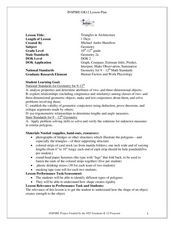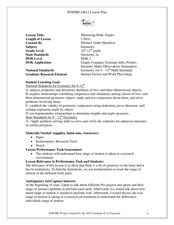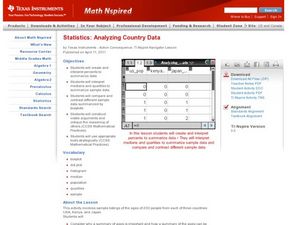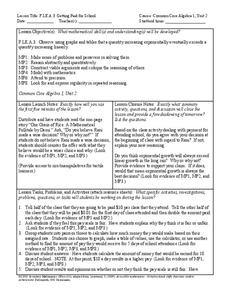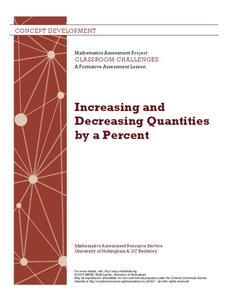Curated OER
Terrific Tessellations
Students create, transform, and critique their own piece of artwork. In doing this lesson, students get more experience working with angles, lines, and measurement. They gain experience seeing, and creating their own patterns and shapes.
Curated OER
Mathematics in Robotics
Learners build and create using math. In this geometry instructional activity, students differentiate between congruent and similarity as they observe polygons. They create robots with different functions using properties of geometry.
Curated OER
Compass Designs
Young scholars investigate the properties of two and three dimensional objects. In this geometry instructional activity, students differentiate polygons based on similarity and congruence. They make observation and interpret the data.
Curated OER
Make a Box
Young scholars use specific dimensions to create a box. In this geometry lesson plan, students analyze the different properties of two and three dimensional shapes. They make conjectures and use it to solve problems.
Curated OER
Triangles in Architecture
Learners find triangles in the real world. In this geometry lesson, students analyze and identify properties of two and three-dimensional objects. They differentiate between similarity and congruence.
Curated OER
Measuring Body Angles
Learners use technology to graph and compare angles. In this geometry lesson, students range of motion in the environment. They identify the missing parts of polygons using similarity and congruence.
Curated OER
Analyzing Body Angles
Pupils investigate angles of polygons. In this geometry lesson, students identify the relationship between angles and the number of sides in a polygon. They differentiate between sumilarity anf congruence in angles and sides.
Curated OER
Identifying Lines of Symmetry
Students calculate the lines of symmetry using polygons. In this geometry lesson, students graph, compare and estimate using collected data. They identify different attributes to the polygons based on their sides.
Curated OER
Studying Special Segments in Triangles
Students investigate special segments in triangles. In this geometry lesson plan, students graph, compare, estimate and predict findings based on their data. They differentiate between similarity and congruence of triangles.
Curated OER
The Probability Project
Students work together to complete a project on probability. In groups, they solve probability equations based on the formula and scenerio given to them in a PowerPoint presentation. To end the lesson, they take a quiz on each problem...
Curated OER
Analyzing Country Data
Students analyze different data in percentage form. In this statistics lesson, students plot data using box-plots, dotplot, and histogram. They compare and contrast the collected data using the boxplot.
Curated OER
Changes in Latitudes, Changes in Attitudes
Sixth graders discuss how people, society, and technology change over time through a unit of integrated lessons. In these changes in society lessons, 6th graders discuss the answers to many questions about how changes effect the...
Curated OER
3-D Model of Lake Benthos
Students create 3-D models of Lake Benthos. In this scale drawing lesson, students create a 3-D model of Lake Benthos. Students work in groups to create the models. Students use the models to to encourage people to conserve natural...
American Statistical Association
Chocolicious
To understand how biased data is misleading, learners analyze survey data and graphical representations. They use that information to design their own plans to collect information on consumer thoughts about Chocolicious cereal.
Mathematics Assessment Project
Solving Quadratic Equations
Scholars first complete an individual assignment using a quadratic equation to model the movement of a bus around a corner. Learners then discuss their solutions with classmates and analyze the provided sample responses.
Mathematics Assessment Project
Evaluating Statements about Probability
Learners first complete an assessment task where they assess statements on probability. They then sort cards containing probability statements as being either true or false.
Howard County Schools
Getting Paid for School
What if you were paid to attend class? What kind of payment schedule would you choose? Learn how exponential functions will eventually exceed linear functions by comparing two different payment schedules for attending class.
Mathematics Assessment Project
Representing Quadratic Functions Graphically
Sometimes being different is an advantage. An engaging activity has scholars match cards with quadratic functions in various forms. Along the way, they learn about how each form highlights key features of quadratic functions.
Mathematics Assessment Project
Designing 3d Products: Candy Cartons
Wouldn't it be great to work in a candy factory? Learners get their chance as they first design a carton for a candy that meets certain requirements. They then examine and analyze nets and explanations in sample student responses.
Mathematics Assessment Project
Increasing and Decreasing Quantities by a Percent
As part of a study of percent and percent change, learners first complete an assessment task with several percent change problems. They then complete an activity using cards to create a diagram expressing percent increases and...
Mathematics Assessment Project
Classifying Proportion and Non-Proportion Situations
Proportions, proportions, everywhere. Class members complete an assessment task solving problems involving proportionality. They then complete an activity classifying given situations as proportional or non-proportional.
Mathematics Assessment Project
Maximizing Profits: Selling Boomerangs
You'll return to this resource again .. .and again ... and again. Class members determine the maximum profit of a boomerang-making business by solving a system of equations. They then review and analyze provided sample responses to...
Mathematics Assessment Project
Calculating Volumes of Compound Objects
After determining the volume of various drinking glasses , class members evaluate sample responses to the same task to identify errors in reasoning.
Mathematics Assessment Project
Generalizing Patterns: The Difference of Two Squares
After completing an assessment task where they express numbers as the difference of squares (i.e., 9 = 5^2 – 4^2), class members note any patterns that they see in the problems.




